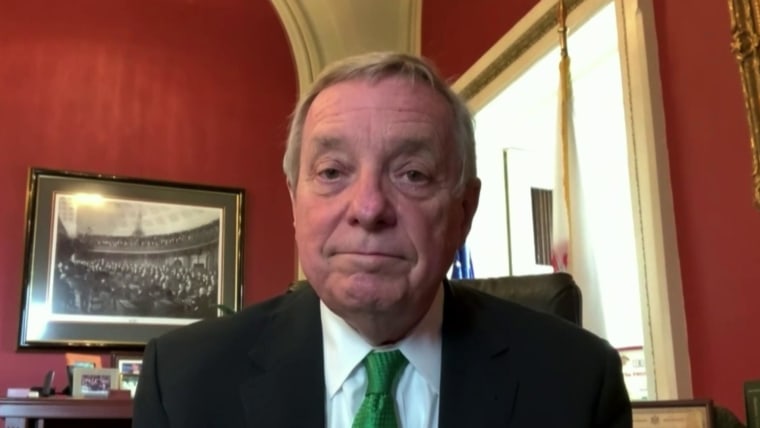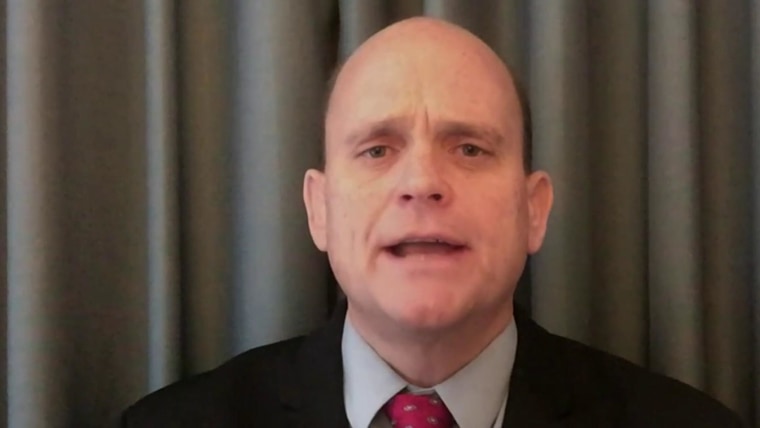One group in need most likely won't be getting much help at all in a new Covid aid package — and that has some deeply upset.
"If you could see my texts and emails from mayors across the country...just how frustrated they are," Nan Whaley, the Democratic mayor of Dayton, Ohio, and vice president of the U.S. Conference of Mayors, told NBC News. "They're as frustrated with Washington, D.C., as regular Americans are. So much bulls---."
While some recent analyses have shown some state and local governments weathered the Covid-19-inflicted pain on their bottom lines better than dire early projections warned, leaders say they're still in need of significant help from the federal government and warned that the impact could be felt the years ahead if no assistance is provided.
Teryn Zmuda, chief economist for the National Association of Counties, said that while the pandemic's impact has varied greatly from county to county, it has been "dire in many areas."
"There's an immediate need for local aid," she said.
On Thursday, Moody's Analytics released its latest update on the shortfalls state and local governments are facing. It now projects state and local governments will face a total shortfall ranging between $330 billion and $470 billion through fiscal year 2022. Pointing only to states, Moody's baseline projection is that those governments will face a $224 billion fiscal shock, down from a projection of $273 billion in September.
The modest improvement is the product of a stock market rebound and a recovery that has "protected tax revenues" coming from those at the top, Moody's said. Already, roughly 1.3 million public sector workers have been laid off since the pandemic's onset, leaving the state and local workforce at its smallest size since 2001, the firm added.
On the other hand, state officials who spoke with NBC News pointed to the Paycheck Protection Program, expanded unemployment benefits, stimulus checks and other assistance that have boosted state and local economies — though not near enough to solve their problems.
"What is certain is that there will be sizable budget shortfalls to address in nearly all states through the summer of 2022," the Moody's report read. "The only real question is whether that money will come from U.S. taxpayers over time funding federal debt issued at record low interest rates, or from state and local taxpayers more immediately from tax hikes and other austerity measures. The answer carries significant economic and fiscal consequences for years to come."
Brian Sigritz, the director of state fiscal studies at the National Association of State Budget Officers, told NBC News that while tax collections, in some instances, have come in above projections in April and May, "in most instances they're still well below what they were before the outbreak of coronavirus."
Some states, including North Carolina, Colorado, Rhode Island and California, have seen higher-than-anticipated early revenues this fiscal year, though that has not cured the budget crunch.
In Michigan, Kurt Weiss, a spokesman for the state budget office, said his state was able to get its finances in order for the current fiscal year "due to the fact that the anticipated revenue shortfall we estimated early in the pandemic was not as bad as projected."
He still has concerns for the next year, adding that "while the overall economic and revenue picture has improved in Michigan since those revenue projections early in the pandemic, our revenues are still down from where we were prior to the pandemic, our unemployment rate remains higher than before the pandemic, and we are hopeful that Congress can come together to help pass additional aid for the states."
California, which saw revenues during the first four months of its fiscal year come in more than $11 billion higher than anticipated — a 22 percent increase over projections — still faces growing deficits over the next four years, according to the state legislative analyst's office.
"Just because revenues have been outpacing projections, that should not be taken to mean or conflated with that the state's economy overall is going gangbusters as well. It's not," said H.D. Palmer, deputy director of external affairs at the California Department of Finance. "We are still continuing to suffer the effects of the Covid recession."
Other states — and many localities — have not seen such increases over initial projections. State and local governments in places where economies are heavily based on tourism or energy, or those with densely-populated cities, have suffered most. And there is concern for governments more reliant on income tax revenue that next year, with filings based on the 2020 pandemic economy, there could be a substantial dip in receipts.
Without new aid, more budget cuts are on the immediate horizon. This week, Gov. J.B. Pritzker, D-Ill., announced more than $700 million in reductions.
Jay Dardenne, commissioner of the Louisiana Division of Administration, said his state is staring down a $600 million budget shortfall "and the only relief in sight would be more federal dollars that are not limited in how we spend them, or a frankly, an unexpected dramatic improvement in the economy."
"I think we're seeing some recovery, and we're seeing some improvement, but we're very concerned, frankly, about next year's forecast based upon personal income tax for the current year, which is a big chunk of our budget," he continued.
Such aid was at the center of ongoing stimulus negotiations, but was stripped from consideration as Democrats and Republicans agreed to table assistance, along with liability protections for employers sought by Republicans. The removal of those items led to the makings of a roughly $900 billion deal that includes stimulus checks, expanded unemployment benefits, an expansion of the PPP program and money for vaccine distribution, rent and food.
Direct relief to state and local governments is likely to get a second-look under President-elect Joe Biden's administration, though what will be able to pass may be dependent on the results of two Senate runoff elections in Georgia. If Democrats win both, they would take control of the Senate.
Democrats are pushing for a Federal Emergency Management Agency disaster fund for states as a way to indirectly deploy some emergency funding in this legislation. Two aides familiar with the discussions told NBC News the emerging plan is to seek "other avenues" to grant state and localities assistance.
The amounts being discussed are nowhere near the hundreds of billions states and localities have asked for. Direct payments to these governments have drawn the most scrutiny from Republicans, who have derided them as "blue-state bailouts" though Republican-leaning states are feeling fiscal stress too.
"I think it's just complete politics," Whaley said. "I think it's just completely that the Democrats wanted state and local (aid), McConnell didn't want it because they wanted it, and wanted to use our communities as a hockey puck for liability, because they don't really care about normal human's lives. They're so out of touch, not even interested in what reality is anymore, that reality doesn't matter to them."
In Dayton, Whaley said city employment has dropped by 5 percent with no immediate plans to fill vacant positions. She added the city will have no incoming class of police and firefighters.
"It's funny," she said, "we've been saying the whole time that Republicans want to defund the police, I guess they're proving it to be so."
"local" - Google News
December 19, 2020 at 07:48PM
https://ift.tt/3apxDqX
'Immediate need': State, local govts decry being left out of Covid aid bill - NBC News
"local" - Google News
https://ift.tt/2WoMCc3
https://ift.tt/2KVQLik
Bagikan Berita Ini
















0 Response to "'Immediate need': State, local govts decry being left out of Covid aid bill - NBC News"
Post a Comment